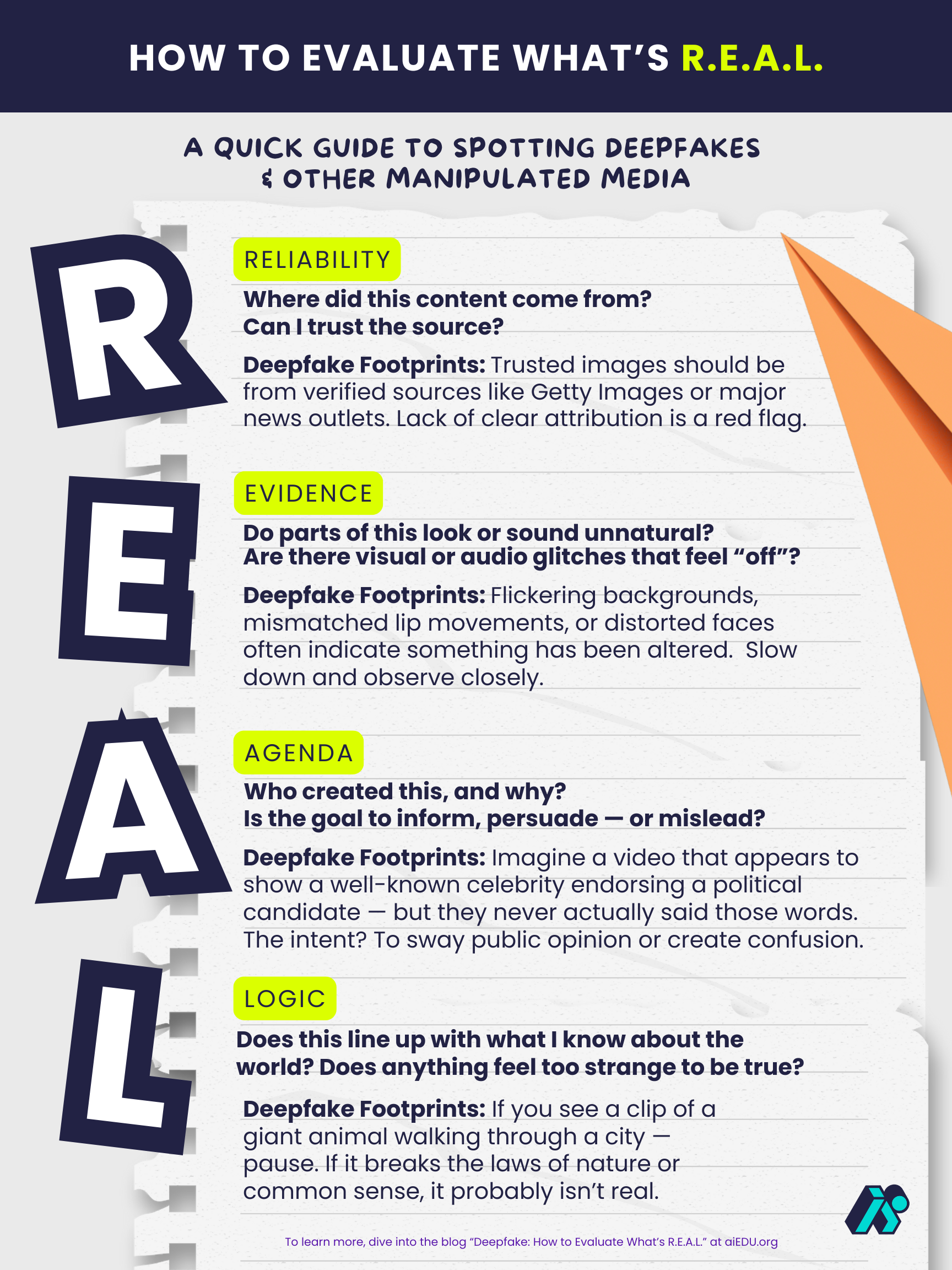NEWS
Introducing a new podcast from aiEDU Studios made in collaboration with Google
Introducing ‘Raising kids in the age of AI’ a new aiEDU Studios podcast created in collaboration with Google
The AI Education Project is excited to announce Raising kids the age of AI, a new podcast created in collaboration with Google that explores how AI is shaping the future of learning and education.
The first meeting of California’s AI in Education Working Group
Last week, aiEDU had the privilege of joining the California AI in Education Working Group’s first public meeting under SB 1288.
aiEDU and Michigan Virtual launch Spark The Future to help educators build their own AI skills
The program brought together educators from across Michigan to deepen their AI literacy and grow as community-centered leaders.
Building AI Readiness in Minnesota: aiEDU supports professional development in Red Wing
aiEDU recently helped lead a professional development session in Red Wing, Minn. as part of the school district’s effort to build AI Readiness for teachers.
Recapping a day of impact: National AI Literacy Day
The second annual National AI Literacy Day is a wrap — now it’s time to look at the impact from an event that brought together educators, community organizations, and AI industry leaders to raise a united voice for AI literacy in K-12 education.
Meet Mandy Johnson. aiEDU’s Q&A with a Trailblazer.
aiEDU connected with Mandy Johnson, who teaches in Anaheim Union School District. She’s also an alum of aiEDU’s Trailblazer Fellowship.
aiEDU expands Trailblazer fellowship, targeting rural and Indigenous communities, to build AI Readiness for America’s teachers
aiEDU announced a significant expansion of its aiEDU Trailblazer Fellowship, which will include eight more cohorts, include six for rural communities.
Perspective: Need a model for AI? Look to Ohio
aiEDU’s CEO and co-founder, Alex Kotran, and Ohio’s Director of Education and Workforce, Stephen Dackin penned an op-ed for Work/Shift that highlights how Ohio is leading the way on AI readiness.
Save the Date: National AI Literacy Day 2026
National AI Literacy Day — a celebration and day of activities supported by the AI Education Project, the EDSAFE AI Alliance, The Tech Interactive and Common Sense Media is returning in 2026.
aiEDU and Quill.org to launch full-year AI literacy curriculum for classrooms nationwide
aiEDU and Quill.org announced an expanded partnership that will deliver a full-year AI literacy curriculum to schools nationwide. Funding from the Patrick J. McGovern Foundation will accelerate development of the project.
aiEDU, The Rithm Project partner to infuse human connection into AI literacy through high school ELA curriculum
The AI Education Project (aiEDU) and The Rithm Project are proud to announce a new partnership focused on advancing AI literacy and AI readiness and human connection in high school English Language Arts (ELA) classrooms. This innovative collaboration will bring to life two new “ELA Snapshots” — curriculum experiences that can be revisited throughout the school year to deepen students’ exploration of human relationships in the age of artificial intelligence.
From learning to application: Spring 2025 Professional Learning takeaways
The AI Education Project (aiEDU) just wrapped a great Spring 2025 professional learning season, from February through May. Here’s a wrap up of our sessions where more than than 300 educators across the globe joined our sessions, which included teacher panels delving into timely topics about AI in education.
aiEDU and Michigan Virtual Partner launch statewide partnership in Michigan
The AI Education Project (aiEDU) is proud to announce a partnership with partner with Michigan Virtual to help make Michigan a national leader in AI education and readiness. Together, aiEDU and Michigan Virtual are launching a statewide initiative to equip educators with the tools, confidence, and support they need to teach artificial intelligence (AI) across K–12 classrooms.
aiEDU receives support to scale AI education and readiness efforts
aiEDU is proud to share new support from the W.K. Kellogg Foundation (WKKF) to support its mission of preparing every student to live, work, and thrive in a world where AI is everywhere. WKKF’s investment will help scale aiEDU’s work building AI literacy and AI readiness.
Deepfakes: How to evaluate what’s R.E.A.L.
Deepfakes are a problem for students and teachers alike. aiEDU’s R.E.A.L. approach gives you a common sense way to deal with them.
aiEDU receives support from NetApp to scale AI education and readiness efforts
aiEDU is excited to share new support from NetApp in support of our mission to prepare every student to live, work, and thrive in a world where AI is everywhere. NetApp’s investment will help scale aiEDU’s work building AI literacy and AI readiness.
From Cincinnati to Toledo: Summits rally educators to build AI readiness
aiEDU’s movement building AI readiness touched every major region of Ohio over the past few weeks, with summits that drove professional connections and professional development in the Buckeye State.
Introducing aiEDU Studios: A new voice in the conversation on AI and the future
The AI Education Project (aiEDU) is proud to announce the launch of aiEDU Studios — a new video-first content studio designed to bring greater depth and clarity to conversations about artificial intelligence, education, and the future of work. Kicking off with a weekly podcast series, aiEDU Studios features long-form, honest conversations with leaders across technology, media, education, and policy.
AI in Appalachia: aiEDU’s summits head to southeast Ohio
aiEDU’s Ohio AI summits continued in Southeast Ohio, with two days of summits in in Wintersville and St. Clairsville that brought together hundreds of educators, administrators, and ESC leaders to explore how schools can lead the charge in preparing students for an AI-powered future.
Northeast Ohio educators lead the way in Mansfield
aiEDU continued its series of summits in Ohio this month with a gathering in northeast Ohio that brought together educators, administrators, and technologists. The summit continued work building AI readiness in the sttate.





















